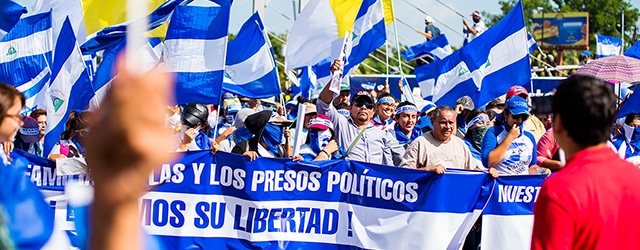Fifteen months after a political crisis erupted, the economy continues to wobble. Some of the damage is self-inflicted; some imposed from outside.

|
NICARAGUA: VITAL STATISTICS |
|---|
|
Location: Central America |
|
Neighbors: Costs Rica, Honduras |
|
Capital city: Managua |
|
Population (2019): 6,348,080 |
|
Official language: Spanish |
|
GDP per capita (2017): US$2,222 |
|
GDP growth (2017): 4.7% |
|
Inflation (2017): 3.9% |
|
Currency: Córdoba |
|
Investment promotion agency: PRONicaragua |
|
Investment incentives available? Tax incentives varying by industry |
|
Ease of Doing Business rank (2019): 132 |
|
Corruption Perceptions Index rank (2018): 152 |
|
Political risks: Complete domestic peace unlikely in the short term |
|
Security risks: American government discourages travel there, further reducing tourism revenues; transshipment point for cocaine destined for the US, arms-for-drugs dealing; violent crime; property confiscations and expropriations |
|
PROS |
|---|
|
Strategic location |
|
CONS |
|---|
|
Forecasts for continued increases in unemployment |
|
Sources: Arkansas Democrat-Gazette, Associated Press, Bloomberg, Business Anti-Corruption Portal, Confidencial, Fox Business, International Monetary Fund, Interpress News Service, Transparency International, US State Department, World Bank, World Population Review |
|
For more information, check out Global Finance‘s Nicaragua Economic Report data page. |
Nicaragua is shrinking.
Last year saw GDP contract 3.8% against expected growth of close to 5%, says Mario Arana, president of the American Nicaraguan Chamber of Commerce. “This year, the projection is between -5% and -10%,” he adds. Local business and foreign-investor confidence have dropped to their lowest levels since Sandinista Daniel Ortega’s return to the presidency in 2007.
Until 15 months ago, the economy had performed well, enjoying a 6.5% jump in GDP in 2012 and annual growth close to 5% from 2013 to 2017. Government, business and labor groups generally collaborated on policy, reassuring international investors. Ortega worked closely on economic development projects with international organizations like the IMF and the World Bank.
Then, in April of last year, a plan to raise social security taxes while cutting benefits sparked protests followed by a government crackdown that left over 300 dead. Since then, talks between the stakeholders have broken down. The tourism, auto and medical-equipment sectors suffered sales drops over the year to April 2019 of 77.5%, 75% and 53.5%, respectively, according to figures from the Superior Council of Private Business. What happened?
Some problems originate outside the country. Aid from Venezuela, whose own economy is being choked by US sanctions, has dropped to nearly zero. In February, Taiwan announced it would lend $100 million dollars; but that lifeline has not materialized. The US administration imposed sanctions on Nicaragua in December, and that, according to one Taiwanese official, made the banks wary. In June, the World Bank reaffirmed its decision to freeze new lending to the country, stipulating that any change would be contingent on an improvement in conditions for project implementation.
Internal problems plague the economy, too. A 2017 corruption assessment by GAN Integrity finds corruption in Nicaragua “impairs the functioning of state institutions and limits foreign investment”; the court system faces “heavy political pressure” and is “susceptible to corruption and manipulation by politicians and criminal organizations”; and the tax and customs sectors are hotbeds of “extortion, facilitation payments, and kickbacks.”
Still, Nicaragua faces nothing like the collapse in Venezuela. Remittances by expatriate workers have increased recently, reaching $384 million in the first quarter, some 8.6% higher than the same period in 2018, according to the central bank. And if the World Bank froze new commitments, it did not cancel existing loans of $541.8 million for a total of 11 projects in agriculture, water and sanitation, telecommunications, land administration, education, health, food security and nutrition, and financial administration. The country’s banking system reports healthy numbers for liquidity and profitability.
An early election could produce a solution to the political impasse. “Investors do not have confidence in the macroeconomic or political stability of the country,” says Arana, who has also served as finance minister and as president of the central bank.
The next election is scheduled for 2021. Ortega has so far rejected proposals for an earlier date.



